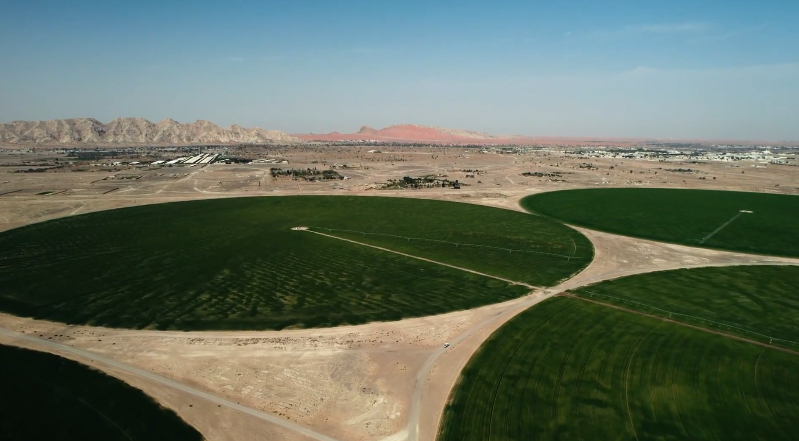Introduction
Sharjah is making groundbreaking strides in agricultural technology with the introduction of high-protein wheat farming, a transformative initiative aimed at boosting food security and sustainability in the UAE. This pioneering effort aligns with the country’s vision to enhance local food production while reducing dependency on imports. As climate change and global supply chain challenges threaten food security worldwide, Sharjah’s innovative approach is set to redefine agriculture in arid regions.
The UAE, known for its desert climate and limited arable land, has long depended on food imports to meet domestic demand. However, with advancements in agri-tech, Sharjah is now leading a movement to produce high-protein wheat domestically. This ambitious initiative utilizes advanced irrigation techniques, AI-driven monitoring, and genetic engineering to create sustainable farming solutions that could revolutionize food production in the Middle East.
The Significance of High-Protein Wheat
Wheat is a staple food worldwide, forming the foundation of many diets. However, not all wheat is the same. High-protein wheat, known for its superior nutritional value, is essential in making high-quality bread, pasta, and other wheat-based products. Unlike regular wheat, high-protein wheat contains elevated levels of gluten and essential amino acids, making it highly sought after in the global food market.

For the UAE, developing a local supply of high-protein wheat is a strategic move. It reduces reliance on international markets, stabilizes prices, and ensures food security. By adopting cutting-edge agricultural techniques, Sharjah is paving the way for the UAE to become a key player in sustainable food production.
Advanced Technologies Driving the Initiative
Sharjah’s high-protein wheat farming initiative incorporates multiple innovative technologies to maximize productivity, minimize water consumption, and improve crop resilience. Here are some of the key advancements:
1. Hydroponic and Aeroponic Farming
Hydroponic and aeroponic systems allow crops to grow without soil, using nutrient-rich water solutions and misting techniques. These methods drastically reduce water consumption, making them ideal for the UAE’s arid environment. By cultivating high-protein wheat through controlled systems, farmers can optimize nutrient uptake and accelerate growth cycles.
2. AI-Powered Monitoring Systems
Artificial intelligence and machine learning play a crucial role in modern agriculture. In Sharjah’s wheat farms, AI-powered sensors and data analytics monitor crop health, soil conditions, and weather patterns. These systems detect nutrient deficiencies, predict disease outbreaks, and provide real-time insights to farmers, ensuring optimal growing conditions and maximizing yield efficiency.
3. Salt-Tolerant Crop Engineering
One of the biggest challenges in desert farming is soil salinity. Scientists in Sharjah have developed genetically enhanced wheat strains that can thrive in saline conditions. These salt-tolerant crops enable large-scale cultivation in previously unproductive areas, expanding the UAE’s agricultural potential.
4. Precision Irrigation and Water Recycling
Water scarcity is a major concern in the UAE. To address this, Sharjah’s wheat farms use precision irrigation systems that deliver water directly to the roots of plants, minimizing waste. Additionally, water recycling technologies ensure that excess water is purified and reused, further conserving this vital resource.
5. Vertical and Controlled-Environment Farming
By growing wheat indoors using vertical farming techniques, Sharjah is able to maintain year-round production. Controlled environments with regulated temperature, humidity, and lighting protect crops from extreme weather conditions and pests, ensuring consistent supply and superior quality.
Economic and Environmental Impact
The introduction of high-protein wheat farming is expected to have a significant economic and environmental impact on the UAE.
Boosting Food Security and Self-Sufficiency
Currently, the UAE imports nearly 90% of its food supply. By cultivating high-protein wheat locally, the country can reduce its reliance on foreign markets and mitigate risks associated with global supply chain disruptions. A stable domestic production also helps in price stabilization, making nutritious food more accessible to residents.
Job Creation and Economic Growth
The agricultural sector in Sharjah is witnessing a surge in employment opportunities. This initiative requires skilled professionals in biotechnology, data science, and sustainable farming, leading to job creation in various fields. Furthermore, as the UAE becomes a leader in agri-tech, it opens doors for international collaborations and investments in the agricultural sector.
Environmental Sustainability
Traditional farming methods consume large amounts of water and contribute to environmental degradation. By implementing eco-friendly technologies such as hydroponics and water recycling, Sharjah is significantly reducing the ecological footprint of wheat farming. Additionally, by cultivating salt-tolerant crops, the initiative helps restore and utilize previously unproductive lands.
Challenges and Future Prospects
Despite its promising potential, high-protein wheat farming in Sharjah faces several challenges that must be addressed to ensure long-term success.
1. High Initial Investment Costs
Setting up smart farms with AI monitoring, hydroponic systems, and controlled environments requires significant financial investment. However, with government support and private sector involvement, these costs can be mitigated over time.
2. Technological Adaptation and Training
The implementation of advanced farming techniques requires specialized knowledge. Training programs for local farmers and agricultural scientists are essential to maximize efficiency and productivity.
3. Scaling Up Production
Currently, high-protein wheat farming is being tested on a limited scale. To make a substantial impact on food security, large-scale production facilities must be established across different regions of the UAE.
Looking ahead, the UAE aims to expand this initiative by partnering with international research institutions to develop even more resilient crop varieties. With continuous investment in agricultural innovation, Sharjah’s success could serve as a model for other arid regions facing similar food security challenges.
Conclusion
Sharjah’s commitment to revolutionizing agricultural technology with high-protein wheat farming marks a significant step towards a more sustainable and food-secure future for the UAE. By integrating advanced agri-tech solutions, the emirate is not only addressing its own food security needs but also contributing to global efforts in sustainable agriculture.
With the right policies, investments, and technological advancements, this initiative has the potential to transform the Middle East’s agricultural landscape. As Sharjah continues to lead in innovation, the UAE is poised to become a global hub for smart farming, ensuring a healthier and more resilient food system for generations to come.
Do follow Uae stories for more Updates












